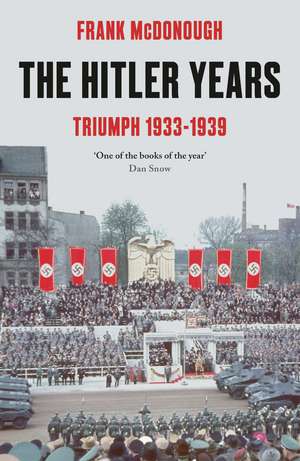The Hitler Years ~ Triumph 1933 - 1939
Autor Dr Frank McDonoughen Limba Engleză Paperback – 11 noi 2020
Preț: 60.15 lei
Preț vechi: 83.50 lei
-28% Nou
Puncte Express: 90
Preț estimativ în valută:
11.51€ • 12.50$ • 9.67£
11.51€ • 12.50$ • 9.67£
Carte disponibilă
Livrare economică 01-15 aprilie
Livrare express 15-21 martie pentru 48.49 lei
Preluare comenzi: 021 569.72.76
Specificații
ISBN-13: 9781789544695
ISBN-10: 1789544696
Pagini: 480
Ilustrații: 2 x 8pp col
Dimensiuni: 129 x 198 x 33 mm
Greutate: 0.37 kg
Editura: Bloomsbury Publishing
Colecția Apollo
Locul publicării:London, United Kingdom
ISBN-10: 1789544696
Pagini: 480
Ilustrații: 2 x 8pp col
Dimensiuni: 129 x 198 x 33 mm
Greutate: 0.37 kg
Editura: Bloomsbury Publishing
Colecția Apollo
Locul publicării:London, United Kingdom
Caracteristici
First volume of the first narrative driven history of the Third Reich since the 1960s.
Notă biografică
Professor Frank McDonough is an internationally renowned expert on the Third Reich. He studied history at Balliol College, Oxford and gained a PhD from Lancaster University. Now based in Liverpool, McDonough has written many critically acclaimed books, including The Gestapo, Sophie Scholl and most recently The Hitler Years, a two-volume history charting the rise and fall of the Nazi regime.
Recenzii
A masterclass in the history of Nazi Germany, with an internationally renowned expert as the teacher
What makes this volume really stand out is its stylish design and more than 80 coloured photographs, punctuating the account of Hitler's slow but inevitable march to war
With an eye for telling detail, McDonough tells the monstrous but well-known story in an attractive fresh way
One of the books of the year
An expert, disheartening account of the first seven years of Hitler's chancellorship... Hitler biographies are not in short supply, but this one is worthy of study
Triumph is the more interesting for pushing back against the cartoon of Hitler as all-conquering monster-supermensch. Instead it demonstrates the slow creep of the Nazi state takeover, the caution with which Hitler had to move, the resistance that he often faced and his surprising, instinctive flexibility
McDonough points to the starker reality. In Nazi Germany, citizens worked more hours for less pay. Nor was there any great altering of class consciousness or redistribution of wealth as there had been in, say, the Soviet Union. The other central claim this excellent book makes is that Hitler's road to power was one where flexibility co-existed in tandem with shifting political events in real time. The historian insists that Nazi Germany was not a totalitarian society in the way that Stalinist Russia was. Hitler's appointment as Chancellor of Germany in January 1933, after all, was both legal and constitutional. There was no violent revolution as there had been in Russia in 1917 or France in 1789
The book unfolds like a thrilling Scorsese-directed gangster movie. It could certainly form the basis of a blockbuster. McDonough treats his readers to all the fascinating insights one would expect from a rich career of study as he dedicates an entire chapter to each year of Adolf Hitler's evil rule in the 1930s
This first volume of McDonough's mega two-volume history is aptly subtitled, 'Triumph', for that is what it is. Everybody even remotely interested in Nazi Germany should have an empty space on their bookshelf, waiting to be filled by volume 2. McDonough's prose matches the rigour of Kershaw, the wit of Evans and the fluency of Shirer. But he brings a new and distinctive clarity to this subject which is all too often lost in the thematic or obscured by the overly academic
I've read every book written about the 2nd Word War, I think. Frank McDonough's latest is the clearest, most brilliant writing on the drumbeat to conflict I've ever absorbed. Cannot wait for volume 2
McDonough presents Hitler as 'a master of flexibility and improvisation' in his takeover of the German government, and delves deeply into his power struggles and shifting alliances with business leaders, civil service bureaucrats, and military officials
A nuanced overview of the early days of Nazi Germany... A work that will bridge the divide between popular and academic audiences
What makes this volume really stand out is its stylish design and more than 80 coloured photographs, punctuating the account of Hitler's slow but inevitable march to war
With an eye for telling detail, McDonough tells the monstrous but well-known story in an attractive fresh way
One of the books of the year
An expert, disheartening account of the first seven years of Hitler's chancellorship... Hitler biographies are not in short supply, but this one is worthy of study
Triumph is the more interesting for pushing back against the cartoon of Hitler as all-conquering monster-supermensch. Instead it demonstrates the slow creep of the Nazi state takeover, the caution with which Hitler had to move, the resistance that he often faced and his surprising, instinctive flexibility
McDonough points to the starker reality. In Nazi Germany, citizens worked more hours for less pay. Nor was there any great altering of class consciousness or redistribution of wealth as there had been in, say, the Soviet Union. The other central claim this excellent book makes is that Hitler's road to power was one where flexibility co-existed in tandem with shifting political events in real time. The historian insists that Nazi Germany was not a totalitarian society in the way that Stalinist Russia was. Hitler's appointment as Chancellor of Germany in January 1933, after all, was both legal and constitutional. There was no violent revolution as there had been in Russia in 1917 or France in 1789
The book unfolds like a thrilling Scorsese-directed gangster movie. It could certainly form the basis of a blockbuster. McDonough treats his readers to all the fascinating insights one would expect from a rich career of study as he dedicates an entire chapter to each year of Adolf Hitler's evil rule in the 1930s
This first volume of McDonough's mega two-volume history is aptly subtitled, 'Triumph', for that is what it is. Everybody even remotely interested in Nazi Germany should have an empty space on their bookshelf, waiting to be filled by volume 2. McDonough's prose matches the rigour of Kershaw, the wit of Evans and the fluency of Shirer. But he brings a new and distinctive clarity to this subject which is all too often lost in the thematic or obscured by the overly academic
I've read every book written about the 2nd Word War, I think. Frank McDonough's latest is the clearest, most brilliant writing on the drumbeat to conflict I've ever absorbed. Cannot wait for volume 2
McDonough presents Hitler as 'a master of flexibility and improvisation' in his takeover of the German government, and delves deeply into his power struggles and shifting alliances with business leaders, civil service bureaucrats, and military officials
A nuanced overview of the early days of Nazi Germany... A work that will bridge the divide between popular and academic audiences



